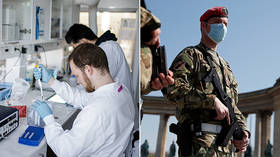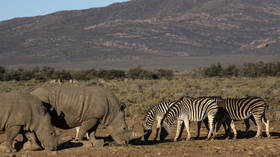Covid-19 has exposed ugliness of GLOBALISM & OPEN BORDERS – and given nations incentive to regain INDEPENDENCE
Globalism’s open borders and just-in-time supply chains have been providing cheap labor and products — but the coronavirus pandemic has shown us the huge cost of neglected independence.
Covid-19 has opened the kimono of globalism, and what’s underneath is ugly. The virus has illustrated the importance of, and our reliance on, just-in-time supply chains. Supply chains are only as strong as their weakest link. If any ingredient is missing from that supply chain, the nation controlling that commodity can break it, causing devastating economic, geopolitical and social consequences.
For example, take emergency medical supplies and critical drugs. Most antibiotics, as well as the main ingredients to produce them, are made in China. India has prohibited the export of hydroxychloroquine, the malaria drug that President Trump touted as a “game changer” in the treatment of Coronavirus. Even basic over-the-counter drugs like paracetamol are “out-of-stock.” Hen’s teeth and capable Central Bankers seem easier to find than N95 facemasks, gloves, thermometers, pulse oximeters, hand sanitiser, and isopropyl alcohol. We also rely on other nations’ electrical parts to run critical infrastructure, trucks, trains, planes and automobiles.
The imposition of national export bans on medical supply chain ingredients is a wakeup call for every nation state that has become reliant upon other nations for products they no longer produce domestically. Scarcity of critical commodities and medical supplies needs to be part of every National Security dialogue. People's lives depend upon the unrestricted access to and supply of these drugs, medical products and equipment, which today, thanks to 30 years of neoliberal globalism, are now beyond our control. We need to rebuild this infrastructure and become self-sufficient in providing necessities. Right now, we don't have the ventilators or drugs required to combat and treat Covid-19 — who decides who lives or dies? We should NEVER have been in this position — we must never be in it again.
Any disruption to our supply chain will result in a surge in unemployment and mortgage defaults, and people won’t be able to feed their families. Civil unrest has already begun in Italy, and it will go viral globally.
Countries need to urgently review and categorize which industries are a matter of national security or, more simply put, are a matter of life or death to their citizens.
When I stood for a seat in last December’s UK Parliamentary elections, independence, restoration of democratic principles and liberty, and financial conservativism were the cornerstone issues guiding my campaign. Each nation state needs to rethink and recategorize its priorities. The health, safety and prosperity of the citizenry should be placed above identity politics, the toxicity of an entitled cancel culture and mob rule by social media. When taking a sober look at Brexit and my reasons for wanting to leave the European Union, Covid-19 provides a stark reminder that in order for a nation to survive and thrive, independence, not interdependence on supply chains should be priority number one. Covid-19 has illustrated how interdependence can cost lives.
Also on rt.com $6 Trillion ‘rescue package,’ unaffordable bailouts and buybacks: Bend over, here it comes again!Covid-19 has ravaged Italy where the death rate has been oscillating between 11% and 14%. These are the highest recorded mortality rates attributed to coronavirus during this crisis. This is an unprecedented humanitarian crisis. They need help and they need it now. They called upon the EU, but the cries fell upon deaf ears. The only help came from Russia. Last time I looked, out of the 154 countries I reviewed in 2017, Italy’s GDP (Gross Domestic Product) growth over the previous 17 years was in the 152nd spot, right above Haiti and Zimbabwe. Italy has issued the most debt in the EU and owes around $4 trillion which, as I have been warning for years, Italy can never and will never repay. A default is imminent. The Great Financial crisis of 2008 caused Italy’s youth unemployment rate to skyrocket. By 2014, these numbers topped 42%, one of the highest in the EU, as Italy’s debt soared.
Of course, central bankers have the ultimate bailout solution. Just follow these instructions:
- Step 1: For Windows, hit Ctrl+P; for Apple, hit Command +P
- Step 2: Kick the can down the road
- Step 3: Repeat step 1
- Step 4: Repeat step 1
- Step 5: Pray and delay
- Step 6: Frantically repeat step 1
- Step 7: Run for cover and shelter in place because our stupidity and hubris, along with too much debt, credit and leverage have crashed the global financial system.
These bankers’ policies have caused a system crash and the greatest economic depression in history is imminent. The good news is since Brexit has been approved, the UK will not have to pick up Italy’s debts, or the debts of the other fiscally profligate EU member states. The money saved will be spent on rebuilding industries, infrastructure and supply chains to repair Britain’s economy. The rebuilding of critical businesses will create thousands of high paying jobs across the United Kingdom at a time when employment opportunities are most needed.
The statements, views and opinions expressed in this column are solely those of the author and do not necessarily represent those of RT.















